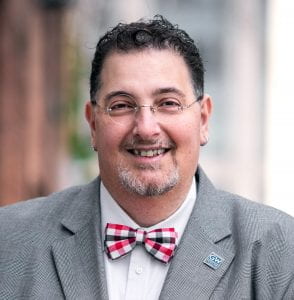An Interview with Dr. Lotrecchiano: “We need teams because we can’t solve problems alone. This brings diversity to the table to solve wicked problems.”
Professor Lotrecchiano’s courses highlight the importance of diverse perspectives and revolutionize concepts of interdisciplinary collaboration.
Professor Lotrecchiano, Associate Professor of Clinical Research and Leadership and of Pediatrics, has been a faculty member with the George Washington University (GWU) since 2005. Maureen Albero, a Community Engaged Scholar at the Nashman Center, learned more about Professor Lotrecchiano’s work.
Before coming to GWU, Professor Lotrecchiano developed Children’s National Medical Center’s leadership program educating professionals who care for children with neurodevelopment and intellectual disabilities in collaboration with 11 area universities. In this program, Professor Lotrecchiano’s work “centered on special needs children with a disability in a clinical setting.” In 2012, Professor Lotrecchiano came to the “University’s side of Health Sciences” and has since been focusing on the development of and research on science teams.
Since Professor Lotrecchiano does not teach a traditional, undergraduate service-learning course, it’s pertinent to briefly explain his courses’ structure. Professor Lotrecchiano teaches courses at the graduate level, CTS 6285, and doctoral level, THS 8103. Students in each course work closely with a “knowledge producing team” in the science community to understand how teams work. In other words, students look at the community at large, not limited to the Foggy-bottom or GW community, and search for “knowledge producing teams” and analyze the team’s dynamic in a scientific setting (hospitals, labs, etc.). Each course is designed to draw “students from a variety of Health Science professions.”
Professor Lotrecchiano’s focus on “knowledge producing teams” is neither limited nor centered within the traditional Health Sciences. Currently, a student pursuing their Ph.D. is looking at how “male barbers are translators in health care.” The theme of this student’s research seeks to analyze “the ways in which knowledge is translated in the social environment.”
Professor Lotrecchiano’s research challenges the traditional “conception of a health team.” As it relates to this Ph.D. student, “barbers may have unrelated interests and motivations, may be dispersed geographically, and may have specific roles others don’t have.” But, the focus of her study and the sentiment of Dr. Lotrecchiano’s challenge seeks to understand what's going on in the environment.
With his interdisciplinary focus, at times Professor Lotrecchiano’s course is “theoretical, but the theoretical lens’ are paired with evidence-based research in the area.” Dr. Lotrecchiano calls this praxis “pairing theoretical approaches with applied research”. In each course, part of the students’ experience is to observe a team “producing knowledge” and to understand the team’s dynamic and ability to produce knowledge. From observations, students critically address the “team’s strengths and weaknesses and assess the ways in which the team could be more effective.” From professional experience, students are able to apply what they learn in Professor Lotrecchiano’s class to the “real world.” As students analyze a Health Science team separate from their profession, students’ observations “seeps back into their professional lives” and enhances their work in their profession as they consider how their own teams might be more effective. With interdisciplinary methods, students critically address team building and collaboration which allows them to quickly apply what they learn in the field to their profession. From this, Professor Lotrecchiano asserts that from students’ “evidenced based experience, they then have a cyclical experience as what they learn in his class is then tested in ‘nature’”.
In an “undergraduate service-learning course, students are not always able to put what they learn in the classroom into immediate practice.” Professor Lotrecchiano believes that it is “increasingly more important to be involved in the community, as it relates to the global community.”
Currently, Professor Lotrecchiano “researches individual’s motivation to be on a team and how it relates to their motivation for collaboration.” If people are “able to leverage an individual’s motivation, the individual will perform better and teams can be more effective.” When measuring individuals or teams, “learning intervention to maximize motivation and to minimize threat.” While Professor Lotrecchiano analyzes individual motivation, this analysis has tremendous and multifaceted impacts on the satisfaction of work forces. If “workforces are satisfied, they work together more effectively, and are more likely to meet their goals.”
To learn more about Nashman Affiliate Faculty and Faculty Learning Communities, click here.
If interested in designating your course as Community Engaged Scholarship, click here.


